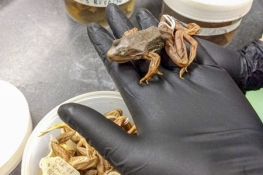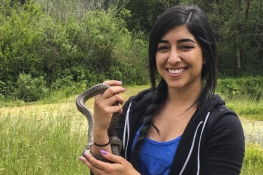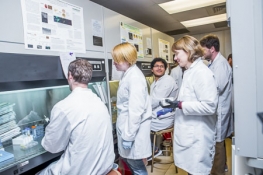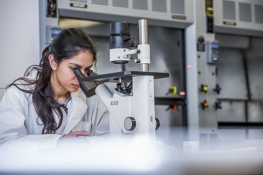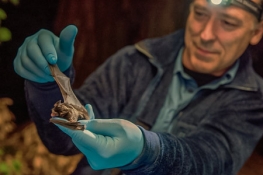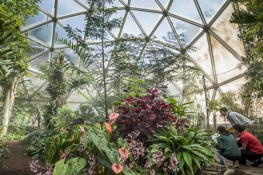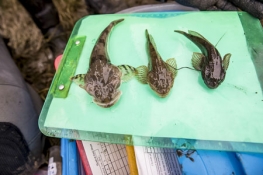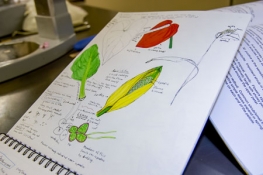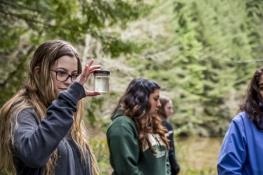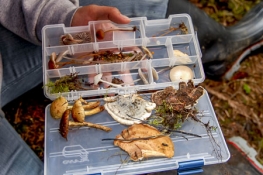Get Involved
Biological Sciences is a thriving community at Humboldt, where you’ll have the opportunity to meet people and apply your knowledge to real world issues.
Here are a few ways to get involved:
Biological Sciences Seminar Series
Every semester we host a series of seminars from widely respected scholars and researchers from labs and universities around the country. Topics have included microbial networks in the skins of Brazilian frogs, evolution of the parrotfish beak, innovations in early land plants, and cancer stem cells. Seminars are open to all students.
Biology Themed Clubs and Co-Curricular Activities
There are a variety of organizations where students, staff and faculty in the department come together to be biologists! Here is a short list of existing opportunities. If you have an idea about a club or event you’d like to sponsor, reach out to a faculty member, staff member, your advisor or the department office and we’ll help you get it started!
Biology Graduate Student Association (BGSA)
Each Graduate Student accepted into the program automatically becomes a member. The Association actively participates with the Department in sponsoring the lecture series and hosts an annual mini-symposium where students, faculty, and staff share their research interests with informative presentations.
The Greenhouse Club
The Greenhouse Club invites students from all majors to participate in greenhouse activities that include propagating plants, practicing integrated pest management, and basic horticulture skills around the greenhouse area. The plants propagated by students are sold by students, and the funds go to support club activities and the basic needs of the greenhouse.
To join the Greenhouse Club, email Greenhouseclub@humboldt.edu
The Greenhouse Club information
The Mycology Club
The Humboldt Mycology Club focuses on field identification of wild mushrooms from the Humboldt region. An annual mushroom fair held on campus features local mushrooms collected and identified by students, practical projects such as dyeing fabrics with mushrooms, mycoremediation, and presentations by local and regional mycology experts.
The Zoology Club
The zoology club welcomes students from any major who share an appreciation for and curiosity about animals! Activities include monthly meetings with guest speakers who discuss their research experiences with animals or from Humboldt resources that can help you achieve your academic, professional, or personal goals. The club organizes fundraisers to support field trips to learn more about zoology. To join the zoology club or to get more information please email zoologyclub@humboldt.edu.
PreMed Society
The Cal Poly Humboldt Pre-Medical Society and BIOL 482 course (Supervised Internship) provide students with networking, shadowing, and volunteering opportunities. Along with helping students increase their involvement with local medical doctors and hospitals, we assist with medical school applications, mock interviews, and much more. We are supported by the Humboldt-Del Norte County Medical Society and have a plethora of doctors lined up to present to students every semester.
Vascular Plant Herbarium
Students are important contributors in helping us to enhance, curate, and maintain our collections! The Herbarium offers several options for further study in plant collecting and identification, curatorial protocols, and taxonomic research. Student volunteers assist with mounting and repairing specimens, various curatorial tasks, and our Digitization Project, which requires specimen photography and image processing. For Directed Study projects, students can make their own specimen collection to contribute to the Herbarium, or they may choose to be an Herbarium Intern. For more information, contact the Collections Manager, Robin Bencie: mrb1@humboldt.edu
Biology Core Facility
The Core Research Facility welcomes Biology, CNRS, and Humboldt students and faculty alike to use its shared research space, equipment, and instrumentation for hands-on research experiences. We are here to provide in depth support at every step from an experimental consult and design of experiment to data collection/analysis and preparing finished products, like reports and posters. We have experience with a wide range of disciplines and are also able to assist with IRB and IACUC permit applications and grant writing.
At any given time the Core hosts multiple ongoing interdisciplinary research projects, course-based research experiences, drop-in equipment and instrument use, as well as community related projects. Faculty, students, and staff from CNRS and Cal Poly Humboldt may request meetings, training, and assistance to use instrumentation and equipment to work on their research projects from design to completion. This shared-use model provided by the Core has proved highly successful. The Core has Faculty users from Biological Sciences as well as Fisheries Biology, Wildlife, Soil Science, Anthropology, and Psychology. In 2020 there were six graduate students and 8 undergraduates working on long-term projects under the immediate supervision of Dr. David S. Baston.
If you wish to find out more information about the Core Research Facility, please feel free to contact us at biosci@humboldt.edu.
Biology Stockroom
The Biology Stockroom is the main source for classroom and student research supplies. We work as a team to help make the department run smoothly. Students learn how to safely handle and store chemicals, handle hazardous materials, and how to make stock solutions. We prepare reagents and equipment used for classes in Biology, Botany, Zoology and more. We strive to give students experience they can take to their first job. The environment is fast paced, friendly, supportive, and team oriented. If you are interested in working with us please contact Susan Wright at sam32@humboldt.edu
Vertebrate Museum
The Humboldt Vertebrate Museum houses a legacy collection of more than 15,000 specimens and has a long history of training undergraduates in museum sciences. If you are interested in learning more about museum sciences and preparing museum specimens please check back in Fall 2021.
Humboldt Marine Mammal Education and Research Program
The MMERP is a research team consisting of graduate and undergraduate students that study local marine mammals. Students in our program conduct monthly beach surveys along 200 miles of coastline in Northern California to look for and document stranded marine mammals. Students also work with our stranding coordinator to respond to calls from the public about stranded whales, seals, and sea lions. Researchers in MMERP also study living marine mammals on land and at sea. We have ongoing research projects on northern elephant seals, Steller sea lions and gray whales. There are about 20 undergraduate interns that gain valuable hands-on experience in MMERP every semester. We advertise for about 5 new internships at the beginning of each semester and provide training workshops in the Fall, Spring and Summer. Please contact marinemammals@humboldt.edu for more information about upcoming internship availability.
Telonicher Marine Lab
The Cal Poly Humboldt Marine Laboratory is located in Trinidad, California, about 14 miles north of the main Humboldt campus in Arcata. The Marine Lab has a well-deserved reputation for high quality natural resources and sciences programs. Few marine laboratories can offer undergraduate and MS level graduate students with such fine opportunities to carry out independent research projects in their wet labs in an area which provides access to a wide diversity of marine and coastal habitats. The Marine Lab is well supplied with basic equipment and materials required for marine biology, mariculture, larval fish studies, and biological oceanography in addition to more specialized instrumentation and equipment. Other marine facilities include a fleet of small boats, a 26' pontoon boat and a 90-foot, ocean-going research vessel, the R/V Coral Sea, which are used by Humboldt scientists and students and also operate a Remotely Operated Vehicle. Students are welcome to visit the lab any time. For those interested in working at the lab, or using any of our vessels, contact your faculty advisor or the instructor of one of your courses to start a project. Funding for student projects is available through the CSU-wide COAST (Council on Ocean Affairs, Science and Technology) and the Humboldt Marine and Coastal Sciences Institute.
Botanical Culture Facility
The Botanical Culture Facility is located in Science D and a variety of micro and macro organisms are cultured for use as teaching organisms for the Biological Science laboratory courses. Students are encouraged to contact the Botanical Culturist for help with their independent research projects which may involve the isolating and/or culturing of freshwater algae, marine algae, cyanobacteria, slime molds, water molds, and microfungi on petri dishes. In addition, funding for a work-study or a student internship is usually available depending on the budget. Students have assisted with basic laboratory tasks such as glassware washing (always needed!) to more advanced tasks such as photographing specimens, preparing media, and collecting and isolating organisms of special interest. If a student has a special interest that they would like to explore, they are encouraged to communicate with the Botanical Culturist.
Humboldt Natural History Museum
The Humboldt Natural History Museum is located in Arcata across the street from Wildberries Marketplace. The mission of the Humboldt Natural History Museum, through its collections, exhibits, and programs, is to inspire an understanding and appreciation of the dynamic natural world. We invite Humboldt students to help us in this endeavor through internships, volunteering, student employment, and class projects. The Museum offers a variety of opportunities to practice science outreach and share your passion for the field with learners of all ages.

